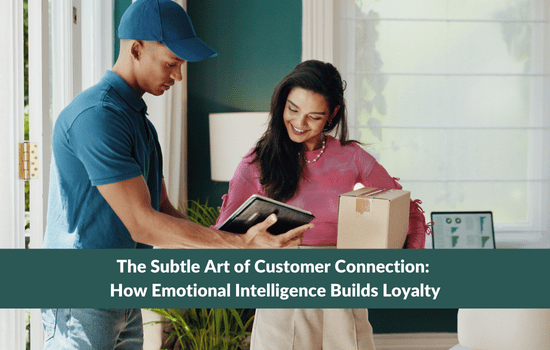In today’s competitive marketplace, customers don’t just buy products or services; they invest in experiences and relationships. What truly sets organizations apart is the authenticity of their interactions, the subtle signals that show they genuinely care.
Authenticity and Emotional Intelligence: Keys to Trust and Exceptional Customer Experience
From a warm smile to attentive listening, these non-verbal cues are rooted in emotional intelligence, shaping how customers feel during every touchpoint. When businesses demonstrate genuine empathy and presence, they foster trust, elevate the customer experience, and build lasting connections that transform casual buyers into loyal advocates.

The Power of Authenticity in Customer Interactions
Customers have a natural ability to sense whether an interaction is genuine or forced. Scripted responses and transactional behaviours may get the job done, but they rarely leave a lasting impression. Authenticity, on the other hand, shines through in subtle ways, a warm smile, natural eye contact, or the willingness to pause rather than rush through a conversation.
When employees approach customers with authenticity, they signal respect and genuine interest. These small but meaningful actions set the stage for an elevated customer experience. More importantly, authenticity is what makes an interaction memorable, planting the seeds for trust and loyalty.
Emotional Intelligence: The Hidden Advantage in Business
At the heart of authentic customer interactions lies emotional intelligence, the ability to understand, manage, and respond to emotions in both ourselves and others. In a customer-facing role, this translates into picking up on non-verbal cues, listening with intention, and responding in a way that makes customers feel understood.
Tone of voice, body language, and even silence often carry more weight than the words themselves. A frustrated customer may not say they need patience, but an emotionally intelligent employee can sense it, slowing their pace, lowering their tone, and creating a calmer environment. This skill transforms routine exchanges into moments of connection, setting businesses apart in a crowded marketplace.
Trust Is Built in the Small Moments
Trust is rarely formed in grand gestures; it grows quietly in the small, consistent ways we make others feel seen and valued. Customers often decide whether they trust a business within seconds of an interaction, not because of the product, but because of the person representing it. Non-verbal cues, such as steady eye contact, a calm tone of voice, or the willingness to pause and listen, signal to the customer: 'You matter here.'
These micro-moments may seem insignificant, yet they leave lasting impressions. A cashier who greets a customer warmly, a service representative who leans in and listens without interrupting, or a manager who remembers a returning client’s name, these subtle behaviours communicate care beyond the transaction. They are rooted in emotional intelligence, the ability to recognize and respond appropriately to emotions in ourselves and others.
When trust is nurtured in these small ways, it becomes the glue that keeps customers coming back. They don’t just return because the price is right or the product is reliable; they return because they feel safe, valued, and respected. That is the quiet but powerful impact of emotional intelligence in action.
Customer Experience Beyond Transactions
Today’s customers expect more than efficiency; they want to feel valued. A fast resolution means little if the customer walks away feeling dismissed or unheard. The customer experience is shaped less by what was done and more by how it was done.
Consider two scenarios: In the first, a customer is rushed through a process, barely making eye contact with the staff. In the second, the employee takes a moment to greet them warmly, acknowledges their concern, and makes the effort to listen. The actual outcome may be identical, but the customer’s emotional takeaway is vastly different. The second interaction, although of shorter duration, leaves them feeling respected and cared for.
Emotional intelligence ensures that the customer experience goes beyond transactions; it becomes an opportunity to build meaningful relationships.
Connection That Creates Loyalty
Ultimately, loyalty stems from connection. Customers may come to you once because of convenience, but they return because they feel understood and valued. When businesses consistently demonstrate authenticity, emotional intelligence, and trustworthiness, they create bonds that extend far beyond a single purchase.
These connections are powerful. They transform customers into advocates who recommend your services, defend your brand, and consistently choose you over competitors. In a world where choices are abundant, genuine connection is the true differentiator.
From Casual Buyer to Lifelong Advocate
Every customer interaction is an opportunity to convey care, often without a single word being spoken. By leading with authenticity, practicing emotional intelligence, and prioritizing trust, businesses can elevate the customer experience and foster genuine, lasting connections. These subtle yet powerful behaviours don’t just complete a transaction, they build relationships that transform casual buyers into loyal advocates who return again and again.
The transforming role of emotional intelligence extends far beyond customer loyalty; it influences every aspect of how we lead, communicate, and connect. I explore these themes in depth in my book, The Power of Emotion, where I share how emotional intelligence shapes our personal and professional lives. At Marshall Connects, we also offer Emotional Intelligence Assessments and Coaching designed to help individuals and organizations strengthen these critical skills. By investing in emotional intelligence, you’re not only enhancing growth and development, you’re building the kind of trust and connection that lasts.
More Motivational Reads Here »
How Emotionally Intelligent Are You?
Sign up for Linda’s monthly tips to build your Emotional Intelligence and reduce Emotional Hijacking!

















